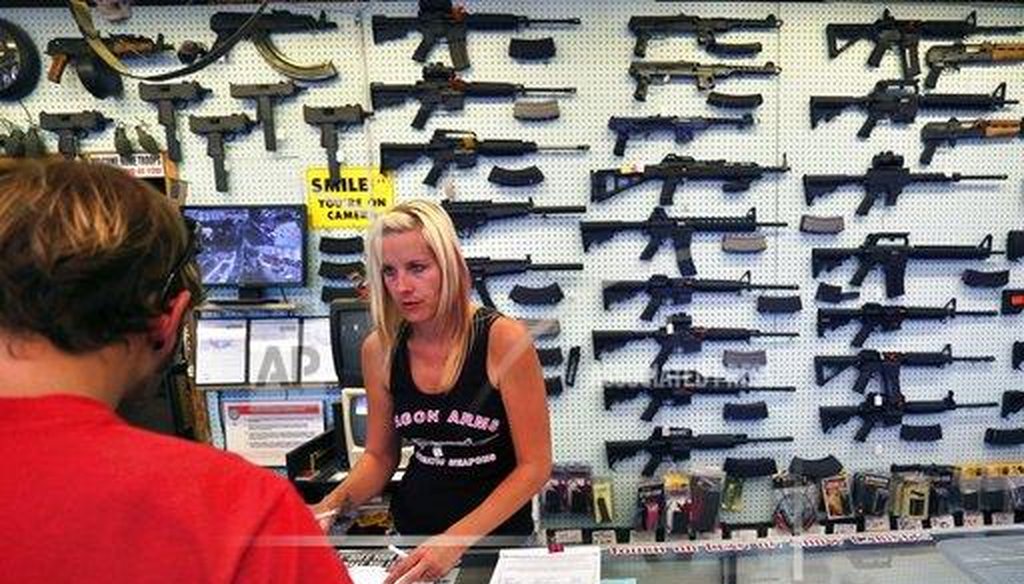



Federal law allows for some abusive boyfriends to be barred from possessing a gun. (AP)
After the mass shootings in El Paso and Dayton, U.S. Sen. Amy Klobuchar, a Minnesota Democrat who is running for president, called for eliminating the "boyfriend loophole."
The loophole, she said on MSNBC, "means that right now if you commit a serious crime of domestic abuse against your wife, you can’t get a gun, but if you do it against your girlfriend, you can, which is outrageous."
Klobuchar has a point, but she oversimplifies the situation.
Federal law bars anyone convicted of any felony from possessing a firearm.
But the gun prohibition, as cited to us by Klobuchar’s campaign, also is imposed on people convicted of misdemeanor domestic violence.
That provision applies to anyone who has or had a domestic relationship with the victim, said University of Wyoming law professor George Mocsary, co-author of a law school textbook on gun laws.
So, despite Klobuchar’s claim, the provision applies to more than just current or former spouses.
It applies if the perpetrator in the domestic abuse has a child in common with the victim; lives or lived with the victim; or is "similarly situated to a spouse."
As for the "similarly situated" language, some courts have said live-in boyfriends would be covered by the law, said Jacob Charles, executive director of the Center for Firearms Law at Duke University. And a regulation promulgated by the federal Bureau of Alcohol, Tobacco, Firearms and Explosives makes it clear that live-in partners are covered, Mocsary said.
Klobuchar’s claim of a loophole is accurate to the extent that the law does not apply to a boyfriend who is or was simply dating the victim, but not sharing a residence or children.
But Mocsary said there is a difference in risk when there is a gun in a domestic situation versus someone who owns a gun but doesn’t live with their girlfriend.
"Everyone agrees that a firearm in a household with domestic violence poses a clear increased danger to the abused partner," he told PolitiFact. But there is no reliable evidence "that there is a similar increased danger" in non-cohabitation situations, he said.
Klobuchar’s claim was made in the context of federal law. But it’s worth noting that 23 states have laws that prohibit at least some abusive dating partners from gaining access to firearms, according to the Giffords Law Center to Prevent Gun Violence.
That includes 19 states that bar people convicted of misdemeanor domestic violence from possessing a gun. Among them are California, Texas, Illinois and New York.
Klobuchar said the "boyfriend loophole" means that "if you commit a serious crime of domestic abuse against your wife, you can't get a gun, but if you do it against your girlfriend, you can."
The gun prohibition, which is in federal law, does not apply to boyfriends who are, or were, in mere dating or more casual relationships.
But it does apply to boyfriends who have a child in common with the domestic violence victim; live or lived with the victim; or who are "similarly situated to a spouse."
Also, 19 states have similar laws on misdemeanor domestic violence cases.
Klobuchar’s statement is partially accurate. We rate it Half True.
MSNBC, Amy Klobuchar interview transcript, Aug. 12, 2019
Email, Amy Klobuchar campaign spokesman Max Steele, Aug. 21, 2019
Giffords Law Center to Prevent Gun Violence, "Domestic Violence & Firearms," accessed Aug. 21, 2019
Interview, National Rifle Association media liaison Amy Hunter, Aug. 21, 2019
Email, UCLA professor of law and gun policy specialist Adam Winkler, Aug. 21, 2019
Email, Duke University Center for Firearms Law executive director Jacob Charles, Aug. 21, 2019
Email, Matt Harron, spokesman for Brady (formerly Brady Center to Prevent Gun Violence), Aug. 21, 2019
Brady, "Laws and loopholes," accessed Aug. 21, 2019
Cornell Law School Legal Information Institute, 18 U.S.C. § 921(33)(A)(ii), accessed Aug. 21, 2019
Cornell Law School Legal Information Institute, 18 U.S. Code § 922, accessed Aug. 21, 2019
Email, National Rifle Association research attorney Christopher Zealand, Aug. 21, 2019
State University of New York - Cortland political science professor and gun control scholar Robert Spitzer, Aug. 21, 2019
Email, Fordham University law professor and gun control/gun rights specialist Nicholas Johnson, Aug. 21, 2019
Email, University of Wyoming law professor George Mocsary, co-author of the law school textbook, "Firearms Law And The Second Amendment," Aug. 21, 2019
In a world of wild talk and fake news, help us stand up for the facts.
